14
14 Broadcaster Press
September 24, 2013 www.broadcasteronline.com
How to make a home handicap accessible
Many homeowners
have found themselves
scrambling to make their
homes handicap accessible after a sudden injury
or illness. In addition,
some homeowners have
found themselves looking to make adjustments
to their homes in anticipation of welcoming elderly, less mobile relatives
into their homes.
Converting a home
into a handicap-accessible space can seem like a
daunting task that
requires adjustments to
nearly every part of the
house. While the extent
of those adjustments
depends on the individual who needs to be
accommodated, some of
the areas homeowners
must address when making their homes handicap
accessible are universal
regardless of the individ-
ual’s condition.
Entryways
A home’s entryways
often must be addressed
when making the home
more handicap accessible. Portable ramps can
be an affordable option
and are often an ideal for
those who only need to
make temporary adjustments, such as when a
resident suffers an injury
that requires he or she
spend some time in a
wheelchair. When the
adjustments will just be
temporary, a folding
wheelchair might be
necessary, as the doorways might not be able
to fit a standard wheelchair that doesn’t fold.
When adjustments
figure to be permanent,
homeowners might need
to expand the doorways
in their homes.
BroadcasterOnline.com
“Get Connected!”
AM LAWN CARE
OFFERING FULL LAWN CARE SERVICE
FALL SPECIAL:
CLEAN UP OF LEAVES
AND BRANCHES
CALL 605-624-9347
OR 605-670-2113
Construction
Gene Hawkins, Owner
605.670.1169
• Roofing • Remodeling
• Concrete Work
• Custom
Sawing
• Re-Sawing
Henderson’s
Ultimate
CAR WASHES
Two Locations Open 24 Hours • 815 Princeton St • 921 E Cherry St • Vermillion
For that Spic-and-Span
show room quality shine!
Hello!
my name is
Introduce yourself to thousands of new
customers with a display ad in the
Broadcaster Press. It’s a great way to
showcase your products and services
to consumers who care about keeping
our community vibrant and strong by
supporting local businesses like yours.
Call Carol at 605.624.4429 today,
and let us start spreading
the word about your business.
Contractors typically recommend expanding
doorways to at least 32
inches, which provides
some maneuverability
when wheelchairs,
which are typically
between 24 and 27 inches wide, are entering the
home. Doorways at the
most commonly used
entryways, including
front doors and doors to
the bathrooms as well as
the individual’s bedroom,
will likely need to be
widened.
Bathroom
The bathroom might
be the area of the home
that needs the most
attention. Slippery conditions common to bathrooms can make things
especially difficult for
people in wheelchairs or
with disabilities. Grab
bars should be installed
in bath tubs and shower
stalls and next to toilets.
But grab bars aren’t
the only adjustment
homeowners should
make in the bathroom as
they attempt to make a
home more handicap
accessible. Safety treads,
which can provide a
secure, slip-free surface
on the floors of showers
and tubs, can be
installed. Add a handheld shower head to the
shower stall to make it
easier for those with a
disability to shower.
Portable transfer seats,
which enable wheelchair-bound men and
women to transition
from their chairs to
showers and bathtubs,
can be purchased and
kept in or near the bathroom.
Water fixtures
An often overlooked
adjustment homeowners
must make when transforming their homes into
handicap-accessible
spaces concerns the sinks
throughout the home.
Disabled persons may
find it difficult to access
faucets on sinks throughout the home, especially
when there are vanity
cabinets beneath the
sinks. Replacing such
sinks with pedestal sinks
can improve maneuverability, but make sure
such sinks are lower to
the ground than standard pedestal sinks. A
sink that’s just a few
inches lower than a standard sink is considerably
more accessible to people
in wheelchairs.
Homeowners can address
this issue by creating
multi-level closet spaces
so individuals can place
their clothes at accessible
heights. Closet shelves
can be lowered and
doors can be widened so
disabled persons can easily manage their
wardrobes. In addition,
consider installing a light
inside the closet and
make sure the light
switch can be easily
reached from a wheelchair.
Making a home
more handicap accessible
can be a significant
undertaking, but many
of the adjustments
homeowners must make
are small in scale and
won’t take long to complete.
Closets
Closets are rarely
handicap accessible.
n Metro Creative Connection



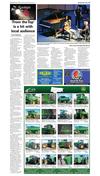

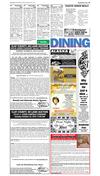
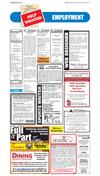
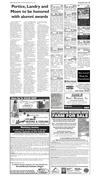
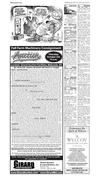
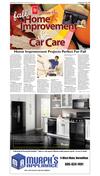
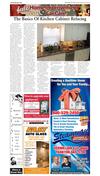

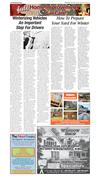

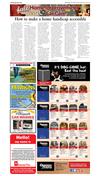


 Previous Page
Previous Page





